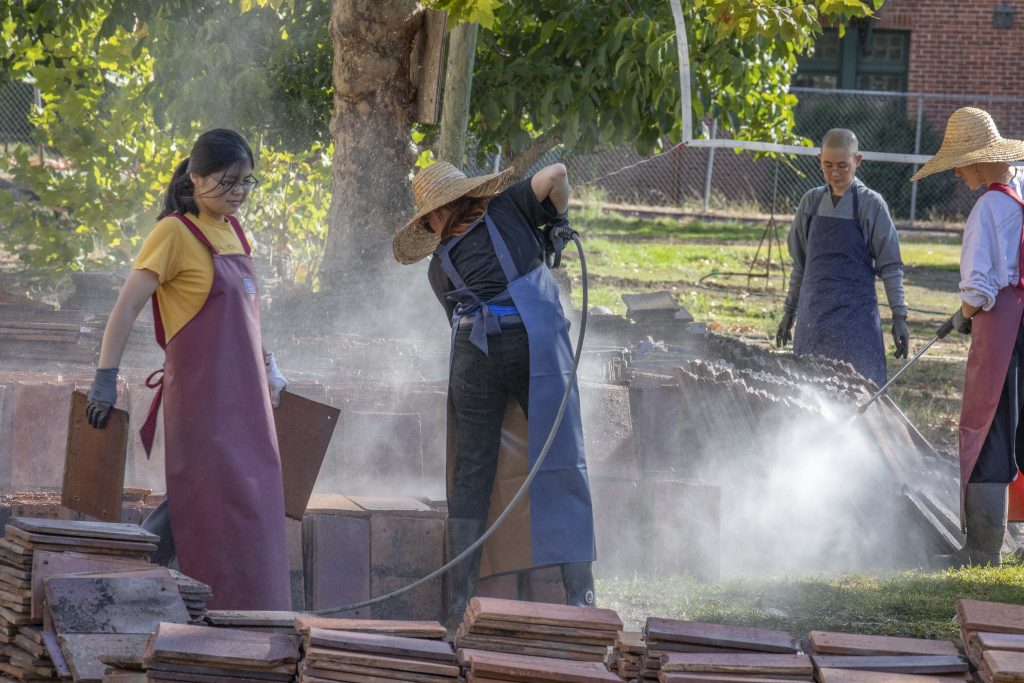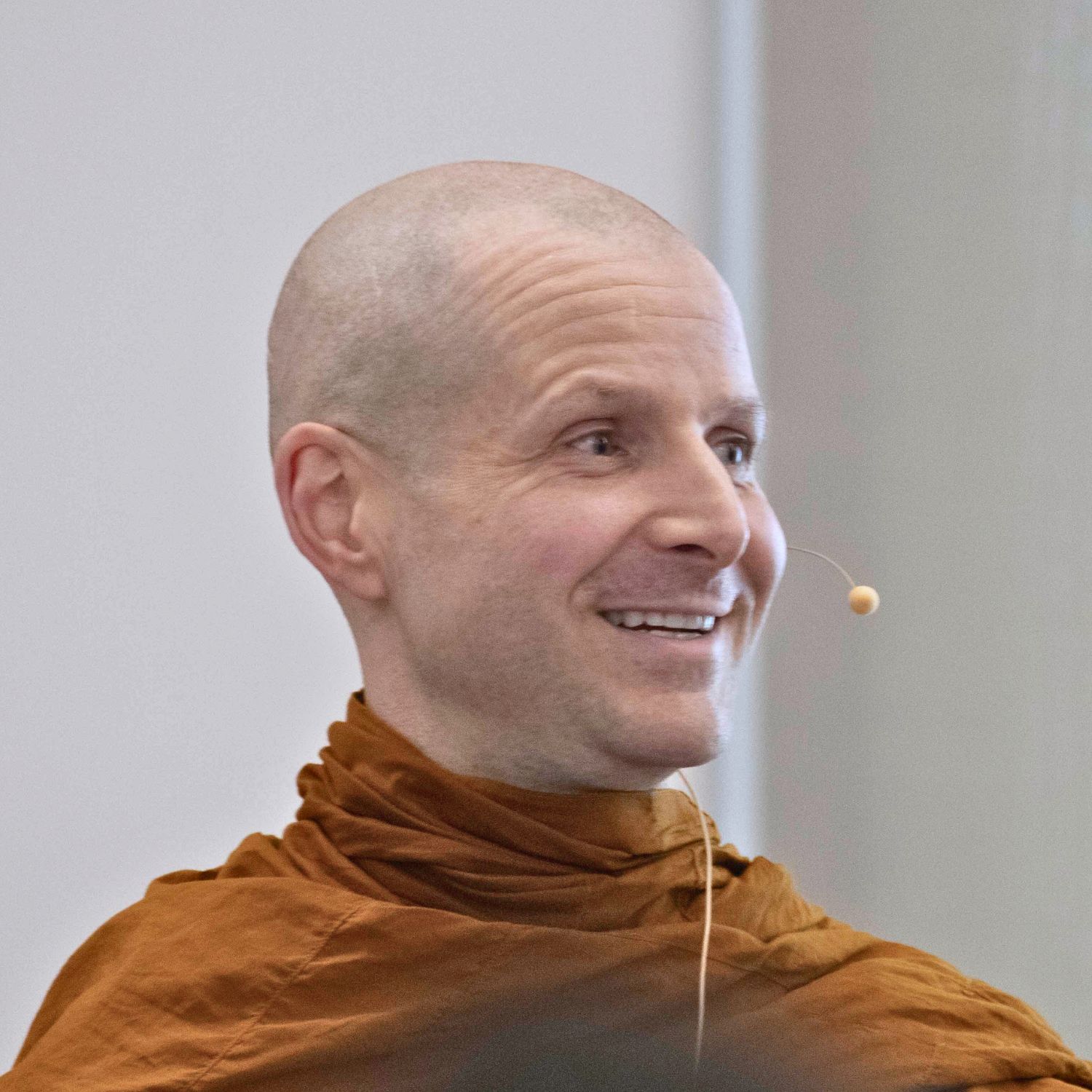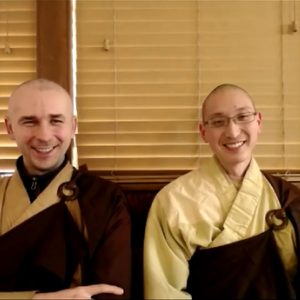
We asked Bhikshu Jin Chuan, DRBU Instructor, and Bhikshu Jin Wei, DRBU MA Alum, to share their reflections on kalyāṇamitras, or spiritual friends, a Buddhist Sanskrit term (Pāli: kalyāṇamitta). The term is also known as “good and wise friends” and “good and wise advisors.” What is a kalyāṇamitra, and why are they important? We share with you the audio interview and a revised transcript below.
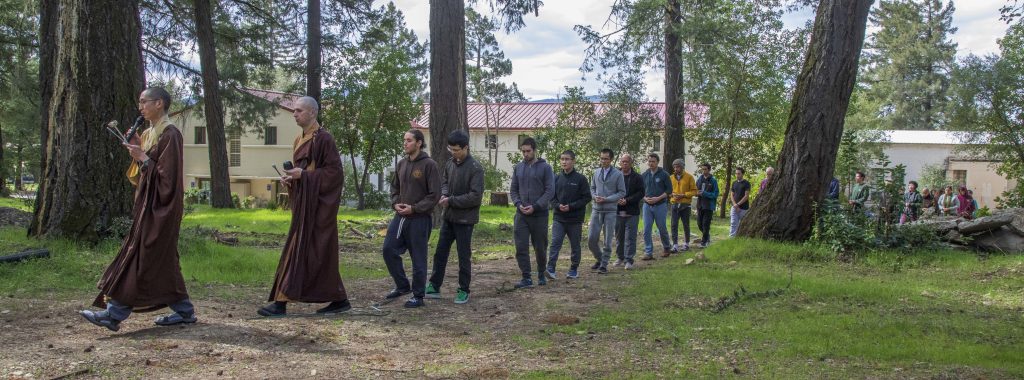
Quinn: I wanted to start with defining a kalyāṇamitra, kind of talking about maybe what are some important qualities, are there different ways of looking at it?
Bhikshu Jin Wei: What first came to my mind was, of course we can put some qualities, right? Like a kalyāṇamitra is someone who has some spiritual integrity or moral integrity, someone who is trustworthy, who cares, who gives us unconditional support, and so on and so on.
But honestly, what I came to was: do I have the kind of attitude in myself to learn from everyone? So through this lens, I can see a kalyāṇamitra who doesn’t fit with these kind of core qualities, but who has helped me develop some of my internal qualities that allow me to move on and develop my spiritual path.
Being in the monastery as a bhikshu, I met many people who are very different, have different cultural backgrounds, who have different personalities, different habits. And some of them are not maybe super inspiring for me to some extent, but still, I found there are a lot of benefits when I can learn from them.
Bhikshu Jin Chuan: Thinking about myself, growing up, making friends, I was, in elementary and middle school, a bit lonely because I got teased quite a bit. From high school, friendship often was a way to avoid loneliness because, just by myself, I felt kind of lost or alone, not really sure where I was. Being with other people gave me a sense of purpose like I belonged somewhere. I felt I was very fortunate that I did find a group of good friends in high school.
What I found quite interesting when I met the Dharma and met a group of young people interested in studying the Dharma was there was a kind of this kind of inner resonance: maybe shared aspirations, a kind of willingness to ask the deeper questions of life. This was at my first retreat at the City of Ten Thousand Buddhas with what was then called Dharma Realm Buddhist Youth.
I remember going to that retreat and feeling almost like meeting long lost friends or something, like I might have known them for a long time – even more, after one retreat, than friends that I had been with for a little bit more than a decade of my childhood.
I think that’s really when I started having the sense of what maybe a spiritual friendship is like. I wasn’t with them so much to avoid feeling lonely, but there was a sense that we’re walking a shared path, going on a shared journey. We were supporting each other in that process.
Over the years, the people that are around have changed, and I’m now constantly surprised by the kind of people that arrive in the field that I’m in. It’s kind of serendipitous, kind of like amazing, eerie and mysterious. Somehow things work. People arrive and, and it’s like, wow, okay. We just keep moving.
And what Jin Wei Shi said, I’ve also expanded my kind of sense of what a good and wise friend is. Everyone who I encounter is a kind of good and wise teacher.
Bhikshu Jin Wei: Maybe I can add, I noticed that spiritual friendship not only can come from quote unquote humans, right? Being recently, frequently, in the Redwood Forest in Santa Cruz mountains, I noticed that I have a lot of support from the trees, for instance, in this kind of environment, in the sacred space, in nature. I feel deeply my kind of spiritual aspiration is nourished very deeply.
Entering into our Buddha hall, seeing our magnificent three Buddhas, gives me a kind of sense of relaxation and inspiration at the same time. Or even, I noticed having the alms bowl: I take this bowl when I travel somewhere, and I kind of feel saved. I, with my companion, to some extent. It reminded me who I am. Same as my robes. They also, to some extent, give me this kind of spiritual support.
I can expand this to this kind of material and not-material, leaving and not leaving, dimension. There’s actually a lot of elements here in the monastery of kalyāṇamitras.
Bhikshu Jin Chuan: This year in spring, I was helping with the Western Classics II class, and we read Aristotle’s Nicomachean Ethics. I was quite struck that he has a lot of the texts devoted to friendship. He explains three kinds of friends:
One kind of friend is for pleasure, one kind of friend is for profit, and one kind of friend is for virtue.
He says that when we’re young, our friends are usually for pleasure. You know, we kind of have our interests and we have fun. Then we have friends who are more for-profit: you do things so that you can move ahead in life. But then he said, you have a few friends who are friends of virtue. You’re here to nurture each other’s virtue.
He says that’s the most reliable, most durable, because virtue is something that doesn’t change so quickly. Where pleasure interests can change, profit can change, virtue is something that is very constant. It’s not everyone that you can have this kind of relationship with, but if you can find somebody whom you can have that kind of virtuous friendship with – just a few – that would be extremely valuable.
This kind of relationship cannot be developed very quickly. It’s something that has to come with a lot of time together because then you know about the person. Only over time do you see who that person is. If it goes too quickly, it could be a false friendship.
And so, the sense of having a virtuous friend is deep in Western culture. I think Nicomachean Ethics might be one of the first, if not the first, systematic ethical treatise in the West. We have Plato and his works, but in terms of really making it like an analytical system, Aristotle does a pretty deep job.
I remember, we were down in our monastery in Boulder Creek, and we had lunch with our neighbors and all the people working together where we went around in a circle. We had a question to check in: what are the three things you value in a friend?
We went around and everyone spoke. But I was really struck by one nine-year-old boy. What three things does he value? Fun… fun… and fun. I thought, “Wow. Perfect.”
Bhikshu Jin Wei: Triple fun! (laughs) Sense of humor is very important.
Bhikshu Jin Chuan: Yeah. We did something similar with the values for the teenagers, and they really value humor and friendship. I think over our lives, we do change in terms of who we end up being with. I think by reading the great texts, by going into a spiritual path, we can mature in our friendships in a real way. Bit by bit, our relationships deepen, our maturity increases. I’m not as naive, but I don’t lose my trust in people’s goodness in an ultimate sense as well. So it’s a kind of a constant process, trusting myself and being a good friend to myself.
Quinn: Jin Chuan Shi, you’ve already talked quite a bit about how this differs from other understandings of friendships that you’ve experienced. Would either of you like to speak on that?
Bhikshu Jin Wei: Definitely. I think Jin Chuan Shi gave a pretty good analysis. The very important criteria is kind of fun and to have a good time, but this good time is sometimes a strategy to avoid our loneliness. You know, to be with someone who’s inspiring. What drove us to people – sometimes it could be a charismatic personality, someone has some talents. It’s so different. I could say, what type of capital we find attractive. Could it be social capital? It can be someone influential to some extent.
So in seeing a spiritual friendship, I think what came to me was that the spiritual books and people, they are like a mirror and window. So knowing good people, spiritual companions, they often act as a mirror for me. I can learn a lot of it by myself, but I cannot see by myself. And of course, we need to establish some trust; sometimes, it can hit me and I feel uncomfortable hearing some feedback for instance. It’s not often that your friend comes to you and says, please give me any feedback, what I did wrong. I really want to learn. It’s not always what we hear from”worldly” companions. We want to learn something deep about ourselves. It’s back to us and our ability to know ourselves, to grow to some extent.
A kalyāṇamitra in another sense is a teacher also, right? So they become a teacher and friend at the same time. We can learn a lot, if we put ourselves in the position to learn, of course. They give us aspirations, encouragement, and support.
If we’re walking the spiritual path very often, sometimes, we have downs. Ups and downs, and so forth. It could even be silent. I remember when I was in Poland, many times the retreats were silent retreats. I didn’t have a chance to speak with any people, so I knew some people just by face. We sat together for many hours every day, and somehow I felt a very deep connection to them. A kind of brotherhood, even, I can say. And the fact that someone is sitting next to me, hour by hour, moment by moment, gives me a lot of support.
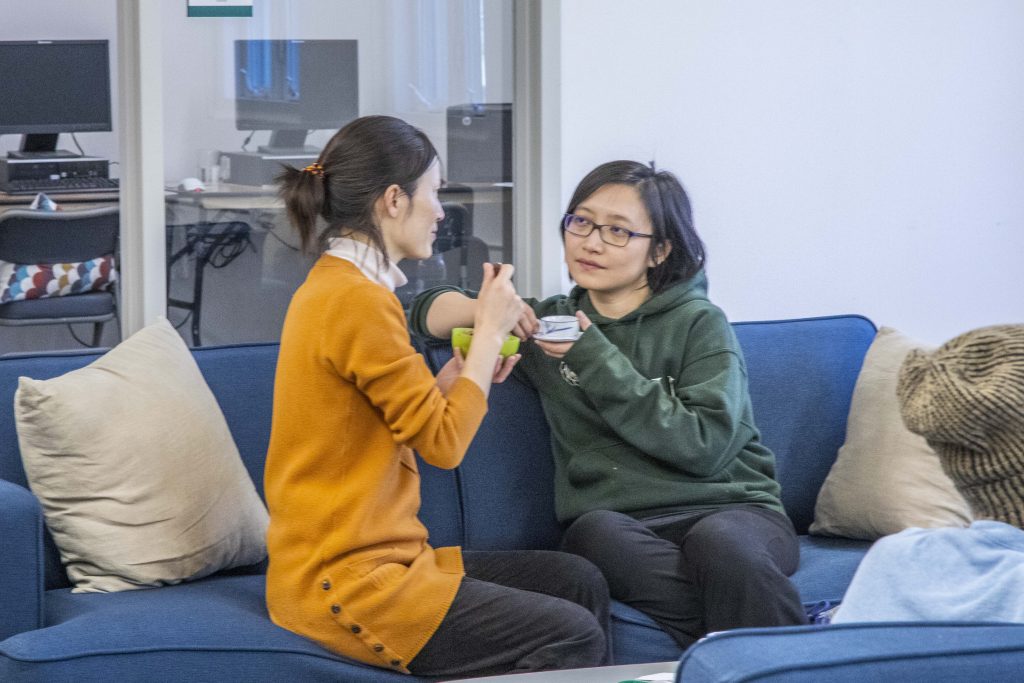
Later, the person who sat next to me passed away in a dramatic situation. I have a deep grief in my heart because he became someone who was important to me even though I didn’t speak much at all.
Bhikshu Jin Chuan: Around this idea of solitude, I’m sure you’ve noticed that famous line within the suttas about how Venerable Ananda goes to the Buddha and says, “Oh, Buddha, you know, surely half of the spiritual life is having noble friends or good friends,” right? Good and wise friends (kalyāṇamitras). The answer that the Buddha gives back to him, which is a little bit provoking, is, “Don’t say that, Ananda. Don’t say that – because the whole of the spiritual path is spiritual friends, is good friends.”
Usually that’s where the quote ends. But if you keep reading, the Buddha actually says that it is spiritual friends that help you develop in the eightfold path that leads to solitude – to disenchantment, dispassion, the cessation of suffering, to liberation. What’s interesting to me is that solitude: a spiritual friend actually leads us to this inner place of wellbeing where we’re not dependent on the other person.
Sometimes in the world, our relationships create dependency. You give me something, I give you something; or maybe we just reinforce each other’s identity to make ourselves feel somehow okay. And on this spiritual journey, that’s actually not what it’s about. It’s about helping you find real freedom. And that’s finding real freedom in your own skin, by yourself. That’s what the friendship’s about, which I think is quite unique.
\DRBU students, staff, and faculty participate in day-long “Metta as a Way of Life” retreat with Ajahn Pesalo, 9/15/19. Photo by Xuan Ooi.If you read the footnote by Bhikkhu Bodhi, he said Venerable Ananda came to this realization on the importance of friendship when he was in seclusion. So he was meditating on his own. He thought, well surely, half the spiritual path is my own effort, and half of it as my spiritual friends. That was a big insight for him. But my sense is because he probably thought a lot of it was his own personal striving. And to me, the beauty in that is that within the solitude, we see our relationships. We’re not ever alone. When we really start to walk on the spiritual path, we realize that we’re not doing this through our own effort. You can say solely every part of us has been influenced by other people – by even material things, living and non-living. And so I really liked that kind of image in my mind of how within the solitude, we find this deep interconnectedness with everything. And within that interconnectedness with everybody else, we find our solitude. We find that inner freedom.
You know, maybe in really good friendships in the world, some people might have that mutual care for each other’s fullest potential. I don’t think it’s limited within the Buddhist context, but I found that within Buddhism, we talk about that more explicitly. The chances of that happening are much higher.
Quinn: You sort of shifted into the sort of third topic I wanted to cover: why are these spiritual friendships important? We have these ideas of the spiritual friend as a mirror, the spiritual friend is someone with whom we’re learning, exchanging feedback, who is validating and recognizing our spiritual aspirations… These are the kinds of themes I’m noticing. Is there anything else you can say about that?
Bhikshu Jin Chuan: Well honestly, this spiritual path is quite difficult. And to go it alone, I would say is pretty much impossible. You know, to try to figure out how to walk the spiritual path completely solo, I think, at least for myself, easily I get lost in my own afflictions through the thicket of views. I get stuck on one view and then take that to be the right way. And then there goes my life, stuck in a view. (laughs)
And friends push us out of that space because oftentimes they don’t share the exact same view. They see something slightly differently and it kind of [makes you think], “Oh, another perspective.” I was going to share one thing. During a ServiceSpace call, they showed this image, and it really struck me. It’s a cartoon, somebody drew, which is:
“Which is more important,” asked Big Panda, “the journey or the destination?” Asking this little dragon.
“The company,” said the Tiny Dragon.
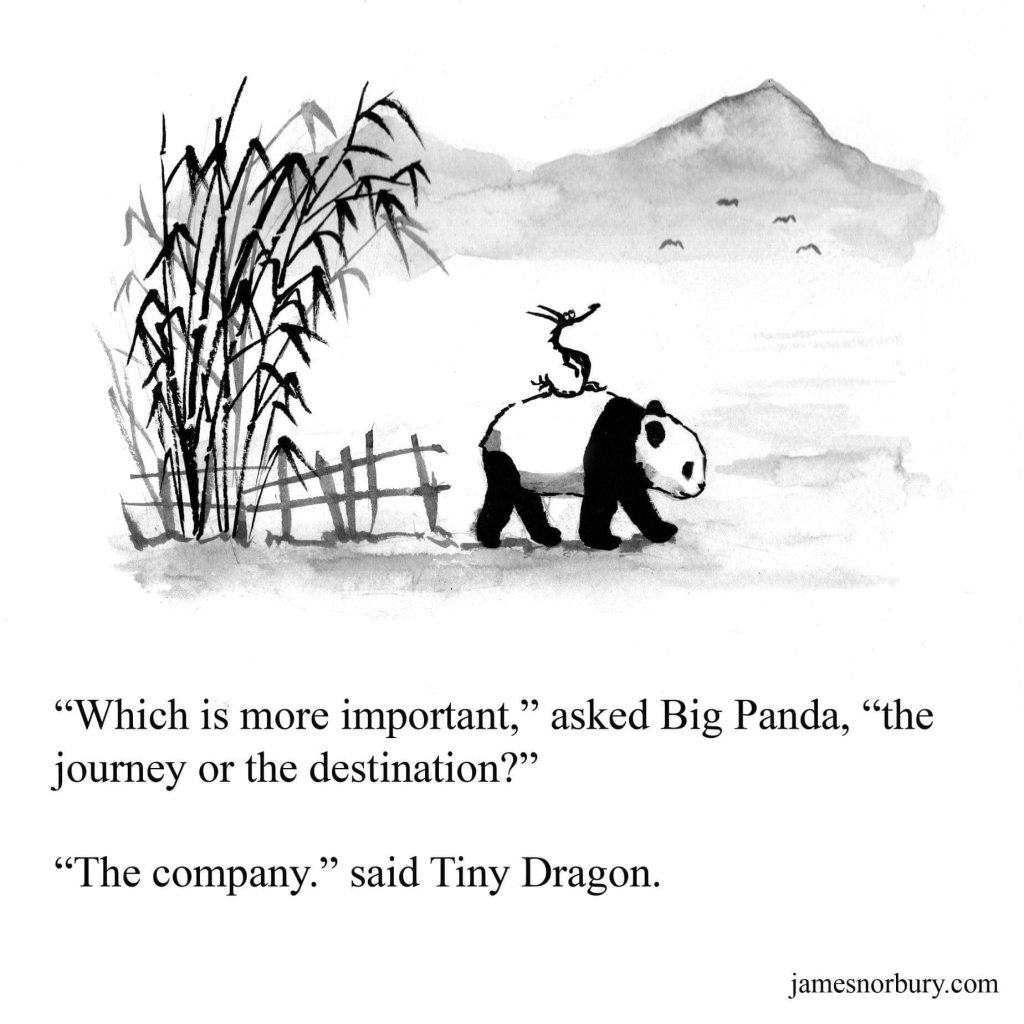
It was really striking to me because oftentimes we get that question. And we go, “Oh yeah, it’s the journey we’re supposed to focus on every step of the way.”
Bhikshu Jin Wei: On the process.
Bhikshu Jin Chuan: On the process. Or no, the goal is actually really important because, sure, you can talk about the journey endlessly, but you need to actually finish what you’re trying to do, right? And when I saw this, I was just surprised because I hadn’t really thought about this before, where the Tiny Dragon goes, “It’s the company.” As in the people that you’re with, the relationships that you create.
And in some sense, if you look at it from a worldly perspective, it’s like, “Oh, maybe we’re just supposed to, you know, just hang out with a lot of people and just enjoy each other’s company.” And you could see it from that lens. But I think if we were to move it to a spiritual lens, you can look at and say, that’s actually all that’s really going on – our affinities, these deeper ties with living beings. How do we nurture all of them so that we all wake up together? We’re all together in this process. So it’s the company. And just to see everyone as a kind of a total journey and destination on to themselves.
Bhikshu Jin Wei: Yeah, what came to me also is the kind of question: sometimes we look outside for this friendship, but, and I ask myself, am I a good spiritual friend first to myself? Because very often, you know, we easily can support others, but we are very harsh to ourselves in some sense. And it’s very difficult to fully accept who we are and say, okay, these are the conditions where I am.
Just move forward and give a hand to ourselves and support ourselves in a very profound way.
And I think the practice of metta is very important. Like for me, for instance, how I can become a friend to myself in a deep sense? How can I also be a friend to others? Because definitely many spiritual friendships come from affinities, but if this affinity can happen, we must develop some spiritual qualities in ourselves so we could even meet each other, or attract ourselves. Because like we see here in the monastery, or even in the Redwood Vihara, some people come and then go – and some want to stay with us. Like our neighbors, I want to hang out, even children. Somehow there’s something there in their heart. I think it’s interesting what makes us comfortable to each other, to some extent. And it is a good question, I think, we can ask ourselves what I can develop to be a good spiritual friend to others – and support them in a very kind of profound way.
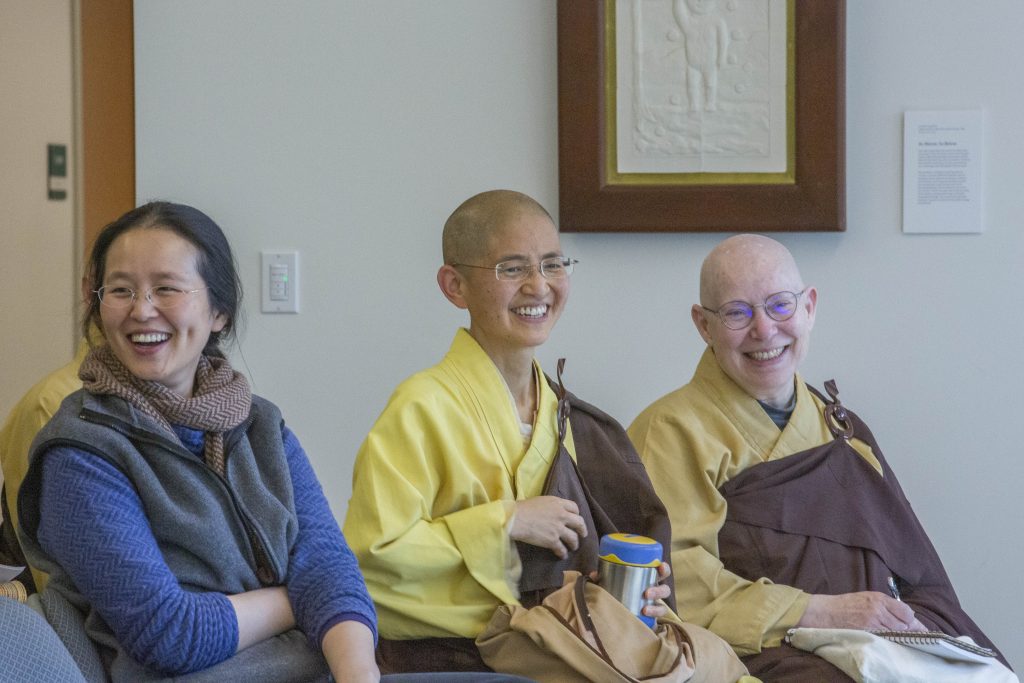
Quinn: So the last thing I wanted to ask you is if you can think of any examples either in your daily life or in the world of a kalyāṇamitra you’d like to share with us.
Bhikshu Jin Wei: Yeah. You know, of course it’s many of them – one sitting next to me. And Jin Fo Shi, anyone who I meet with in my spiritual path, definitely. Without any doubt, I cannot move forward without support from others in this spiritual path. I could not leave home. I could not come to California. I cannot start cultivation because someone showed me, someone encouraged me, you know? And it’s actually a lot of work someone put in just for me to let me grow. It did not happen just because I wanted to do it. There was a lot of deep support.
But in the context of DRBU, I found it was being in the cohort. It was 10 of us, and they were deeply my kalyāṇamitras. People who not only inspire me in some sense from their insights, their questions, their understanding of a text in a very new way, or a new lens they would show me, but I think that one of the best gifts that I received from them is to see their change. They really changed. You know, it’s like, wow! It’s quite amazing to see how the whole group can support each other and grow each other. It doesn’t always have to be nice and pleasant, but I think being at DRBU, many students experience the classroom as a sacred space to some extent. The spiritual friends support this journey together – to go to the text, but mainly, to go to our hearts and discover many stuff there. Inspiring and scary!
And this is the space where we can share this and be understood and not be judged. And have trust in ourselves and in others. It’s a wonderful gift.
So I give you my 10 kalyāṇamitras from my cohort as one of the examples. And the teachers – the teachers’ environment is also very kalyāṇamitra in many sense. You know, being at the City of 10,000 Buddhas, being at the Sudhana Center. A lot of these qualities are there to support inner transformation.
Bhikshu Jin Chuan: Maybe I’ll be very brief and I’ll say what came to mind, similar to Jin Wei Shi – my whole life, many, many people, I felt a deep sense of gratitude for. And especially after walking a spiritual path, when you look back and you see all those in your past, even my old friends who were maybe not on the spiritual path. They’ve definitely helped form me for who I am.
Just, right now, in terms of something that’s kind of alive in my mind is actually the Campus Life staff and being able to see though the amount of work they put into taking care of students and supporting one another. If somebody wants to take time for spiritual practice, there’s this complete support. It’s like, “Just go do it. We’ll do the work to cover you.” I see the spiritual friendships, spiritual support.
Bhikshu Jin Wei: So some somehow, sometimes, we don’t have to look so far to find a spiritual friend because maybe they’re sitting next to us or are very close, not far away. Definitely the whole DRBU community is this kind of hub for spiritual friendship.
